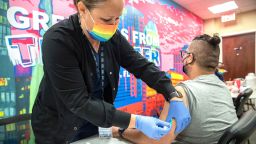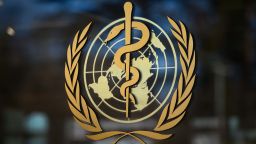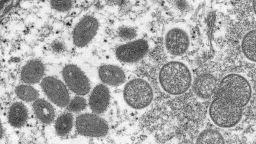Amid growing concern that the United States could face a rise in mpox cases this summer, three new studies show that two doses of the Jynneos mpox vaccine are much more effective than just one.
“Vaccine effectiveness estimates from these studies ranged from 36% to 75% for one dose and 66% to 86% for two doses of Jynneos vaccine,” Dr. Christopher Braden, mpox response incident manager at the US Centers for Disease Control and Prevention, said in a telebriefing Thursday.
“What we take away from these three studies is that the vaccine effectiveness is substantial and that two doses is definitely better than one,” he said. “It will help individuals prevent the acquisition of mpox and it will help individuals avoid severe disease or even death.”
The studies follow an outbreak of mpox, formerly known as monkeypox, that spread across multiple countries last year, resulting in more than 30,000 cases in the United States, disproportionately affecting gay and bisexual men.
In August, the US Food and Drug Administration issued an emergency use authorization for the two-dose Jynneos mpox vaccine to be given to high-risk adults. The vaccine is typically administered in two doses, four weeks apart, but during last year’s outbreak, single doses were administered in effort to stretch supply and inoculate as many people as possible.
While the number of mpox cases in the United States has significantly decreased since the peak of the outbreak in August, officials at the CDC are now urging people who have not completed their second dose of the Jynneos vaccine to do so, ahead of this summer.
Although about 1.2 million vaccine doses have been administered so far, according to the CDC, only 23% of people most at risk have been fully vaccinated nationally.
Effectiveness of mpox vaccination
One real-world study, conducted in a dozen US jurisdictions from August 2022 through March 2023, suggests that two doses of the Jynneos mpox vaccine was 85.9% effective at preventing symptomatic mpox infections, and vaccine effectiveness after one dose was 75.2%.
To evaluate the vaccine’s effectiveness against mpox among men who have sex with men and transgender adults, ages 18 to 49, the researchers from CDC and other US institutions analyzed data on 309 patients with mpox and 608 control patients.
The results from this study are consistent with those from previous studies evaluating vaccine performance or effectiveness,” the researchers wrote in the report, published Thursday in the CDC’s Morbidity and Mortality Weekly Report.
Yet it remains unknown for how long the duration of protection from the vaccine lasts over time. The researchers, from the CDC and other US institutions, wrote that because of this unknown, people at an increased risk for mpox should complete the two-dose series of vaccine.
Another study, published Thursday, also in the CDC’s Morbidity and Mortality Weekly Report, suggests that one dose of the Jynneos vaccine was 68.1% effective against symptomatic mpox infections but two doses was 88.5%.
That study, conducted by researchers at the New York State Department of Health and other institutions in New York, included data from June through December of last year, during which a total of 375 mpox cases were reported to the health department and more than 27,000 doses of vaccine were recorded as being administered.
To estimate vaccine effectiveness against a diagnosed mpox infection, the researchers analyzed data on a sample of 252 men, 18 and older, who were diagnosed with mpox in New York during July through October of last year, and compared their findings with a sample of 255 control patients who had been diagnosed with rectal gonorrhea or primary syphilis in New York.
Their analysis suggests that the vaccine’s overall effectiveness, when combining data on both one dose and two doses, was 75.7%.
The researchers wrote that the mpox outbreak “rapidly declined during summer 2022 after extensive public health and vaccination efforts and individual behavior changes,” but how much decline could be attributable to vaccine effectiveness versus people changing their behaviors versus seasonal variation in how the virus spreads remains unknown.
“Global mpox spread continues and might accelerate during summer 2023, given remaining unvaccinated persons with behavioral risk,” the researchers wrote, adding that their findings support the recommendation for people to complete two doses for optimal protection.
A separate study, published Thursday in the New England Journal of Medicine, suggests that, in the United States, the Jynneos vaccine had 66% vaccine effectiveness against mpox disease after two doses and 35.8% vaccine effectiveness after one dose. Among only people without immunocompromising conditions, vaccine effectiveness appeared to be 76.3% in those who were fully vaccinated and 40.8% in those who had only one dose.
Researchers at the CDC and the organization Epic Research, owned by the health care software company Epic, analyzed data on more than 2,000 patients with mpox and more than 8,000 control patients, who did not have a history of mpox but faced similar risks for the diseases. The researchers found that only 25 case patients had been fully vaccinated with two doses of the Jynneos vaccine compared with 335 control patients. The study period was from August to November of last year.
While the estimates of vaccine effectiveness found in this NEJM study were lower than what was found in the two other studies, Braden said that it was a strong study and “it’s advantageous to have multiple studies to understand what vaccine effectiveness really is in the population.”
The data, which came from Epic’s Cosmos database, showed that the people who were diagnosed with mpox were less likely to be vaccinated than the control patients in the study.
In people who have completed two doses of the vaccine, two out of three mpox cases are prevented and just one dose prevents one in three mpox cases, Jackie Gerhart, chief medical officer at Epic Research and a family medicine physician, said in an email.
“Vaccination remains a key method to preventing illness. While there have been a few reports of breakthrough mpox cases in vaccinated individuals, it is still recommended that you get vaccinated. We hope to study waning and breakthrough cases in the future,” Gerhart said in the email.
“Mpox spreads through skin-to-skin contact. Last year’s mpox outbreak started in the spring/summer and may have been driven in part by festivals, pride events, and other summer celebrations,” she said. “Public health officials, clinicians, and community advocates have helped spread knowledge about mpox and we know more now than we did during last year’s outbreak. Furthermore, we have a vaccine and it is more readily available this year. We are better prepared to support and advocate for at-risk individuals through preventive measures and vaccination.”
This isn’t the first time that CDC research has shown that two doses of the Jynneos vaccine offers more protection against mpox than just one dose.
A separate study, previously published by the CDC in December, found that among US men ages 18 to 49, the incidence of mpox cases in those who were not vaccinated was 9.6 times as high as that in people who had received two doses of vaccine and 7.4 times as high as that among people who had received only the first dose.
That previous study also showed, for every one mpox illness among people who were fully vaccinated with two doses, there were 10 illnesses among people who were not vaccinated.
‘The vaccination level … is not where we need it to be’
As the summer season quickly approaches, federal, state and local health officials continue efforts to raise awareness around the importance of mpox vaccination for people most at risk.
The CDC found in a study in October that among nearly 500,000 people who received a first dose of the Jynneos vaccine and were eligible for a second dose, only 57.6% received that second dose.
“So there’s a real concern that the vaccination level of the people most at risk is not where we need it to be, and we now are experiencing a new outbreak of cases in the Midwest that includes previously vaccinated individuals, although the symptoms appear to be milder for those who had some protection from vaccine,” Lori Tremmel Freeman, chief executive officer of the National Association of County and City Health Officials, told CNN earlier this week.
“There’s much more to unpack here,” she said, “but the vaccine remains the best chance of avoiding severe disease, including hospitalization and death, and people should plan to get vaccinated two weeks ahead of attending any major events where there is risk of exposure to mpox.”
Mpox is a viral disease that spreads through close contact, and while it can infect anyone, during last year’s outbreak, infections were mostly among men who have sex with men. The infection causes distinct rashes that can initially look like pimples or blisters, and other symptoms can include fever, chills, swollen lymph nodes, aches and fatigue. In rare cases, mpox can turn deadly, especially for people with weakened immune systems.
“Vaccination makes getting and spreading mpox less likely, and importantly, may decrease the chances of severe illness, hospitalization and death, even if it doesn’t prevent infection,” Dr. Demetre Daskalakis, the White House’s national mpox response deputy coordinator, said in Thursday’s telebriefing.
“Without renewed prevention efforts, especially vaccination, we are definitely at risk of a resurgence, in fact a substantial risk of resurgence of mpox. This is especially concerning as we approach summer,” Daskalakis said, adding that the CDC already is planning to work with event organizers for LGBTQ Pride Month in June to raise awareness around the importance of vaccinations.
“We have vaccine and we have willing organizers,” he said, and there are about 1.7 million individuals who could benefit from vaccine, according to CDC estimates.
Get CNN Health's weekly newsletter
Sign up here to get The Results Are In with Dr. Sanjay Gupta every Tuesday from the CNN Health team.
The CDC on Monday issued an update to its Health Alert Network warning about the potential risk for new mpox cases this spring and summer, and describing a rise in cases that already has been detected in the Chicago area.
As of Thursday, a total of 21 people have been diagnosed with mpox as part of the cluster in Chicago, Daskalakis said Thursday. Most of the cases were identified in gay or bisexual men and most have had mild symptoms, he said. No hospitalizations have been reported.
“Spring and summer season in 2023 could lead to a resurgence of mpox as people gather for festivals and other events,” the agency said. “The purpose of this Health Alert Network (HAN) Health Update is to inform clinicians and public health agencies about the potential for new clusters or outbreaks of mpox cases and to provide resources on clinical evaluation, treatment, vaccination, and testing.”
Health - Latest - Google News
May 19, 2023 at 12:17AM
https://ift.tt/BUfzvwb
As officials warn about possible summer rise in mpox, new studies show two doses of vaccine are better than one - CNN
Health - Latest - Google News
https://ift.tt/WXPZ65K
Bagikan Berita Ini

















0 Response to "As officials warn about possible summer rise in mpox, new studies show two doses of vaccine are better than one - CNN"
Post a Comment